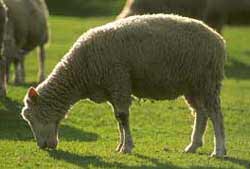Study Shows Sheep Have Keen Memory for Faces

You would be forgiven for underestimating the intelligence of sheep, considering that their daily activities revolve around grazing. But research reported in the current issue of Nature indicates that, in fact, sheep possess more smarts than previously thought.
Keith Kendrick and colleagues at the Babraham Institute in Cambridge, England, investigated the sheep’s ability to distinguish and remember faces of both other sheep and humans. Presenting 20 sheep with pictures of 25 pairs of sheep faces, the researchers trained the animals to associate one of the pair with a food reward. They determined that the sheep could recognize the individuals associated with a reward even in profile and for up to two years. By measuring activity in the right temporal and medial frontal cortices—regions of the ovine brain associated with visual recognition—the team further discovered that sheep can remember as many as 50 sheep faces in addition to a familiar human face. And sightings of familiar faces do not go unacknowledged. The scientists report “clear behavioral signs of recognizing both absent individuals by vocalizing in response to their face pictures in the same way as they did to faces of other members of their current social circle.” So the next time you hear a sheep bleat, he may just have seen a long-lost flock-mate.
The recollection of fellow sheep weakens slowly but progressively over time, the team concludes, with the memory of a specific individual fading first into a generalized category of familiar individuals before it is forgotten completely. Indeed, the face-processing system at work in the sheep brain is analogous to the mechanism by which humans remember and recognize individuals over long periods. “This suggests,” the authors write, “that sheep may be capable of using the same system to remember and respond emotionally to individuals in their absence.”
Media Contact
More Information:
http://www.sciam.com/news/110901/1.htmlAll latest news from the category: Life Sciences and Chemistry
Articles and reports from the Life Sciences and chemistry area deal with applied and basic research into modern biology, chemistry and human medicine.
Valuable information can be found on a range of life sciences fields including bacteriology, biochemistry, bionics, bioinformatics, biophysics, biotechnology, genetics, geobotany, human biology, marine biology, microbiology, molecular biology, cellular biology, zoology, bioinorganic chemistry, microchemistry and environmental chemistry.
Newest articles

First-of-its-kind study uses remote sensing to monitor plastic debris in rivers and lakes
Remote sensing creates a cost-effective solution to monitoring plastic pollution. A first-of-its-kind study from researchers at the University of Minnesota Twin Cities shows how remote sensing can help monitor and…

Laser-based artificial neuron mimics nerve cell functions at lightning speed
With a processing speed a billion times faster than nature, chip-based laser neuron could help advance AI tasks such as pattern recognition and sequence prediction. Researchers have developed a laser-based…

Optimising the processing of plastic waste
Just one look in the yellow bin reveals a colourful jumble of different types of plastic. However, the purer and more uniform plastic waste is, the easier it is to…



